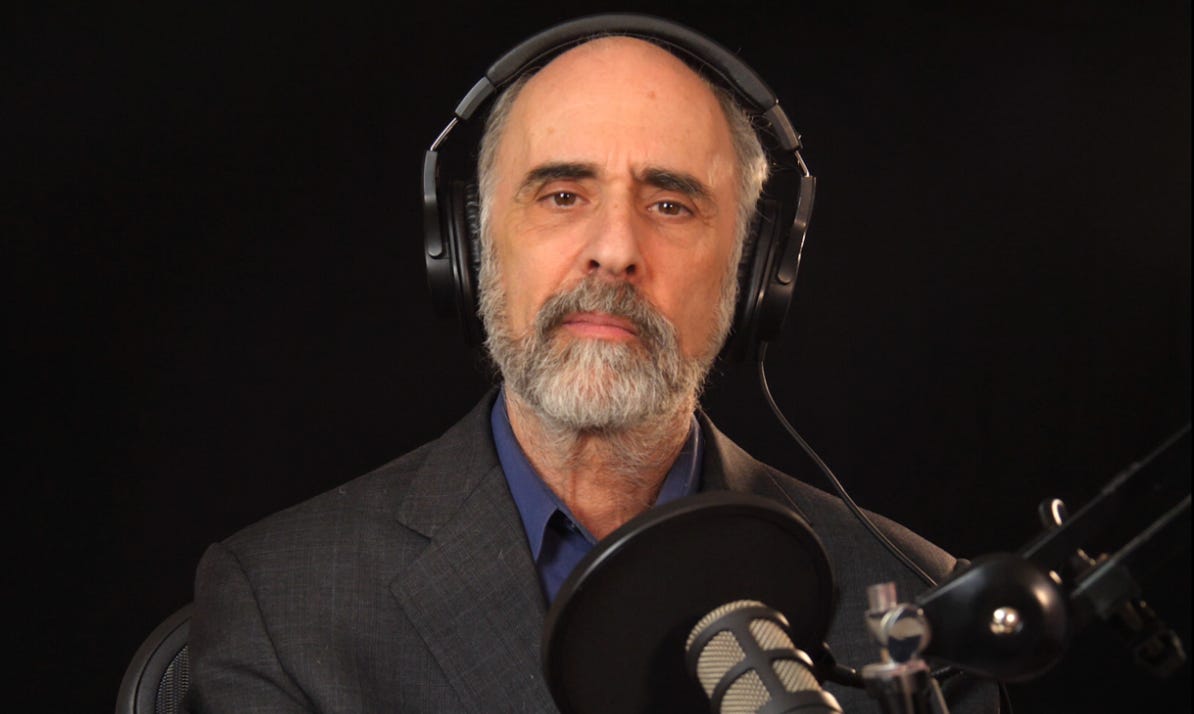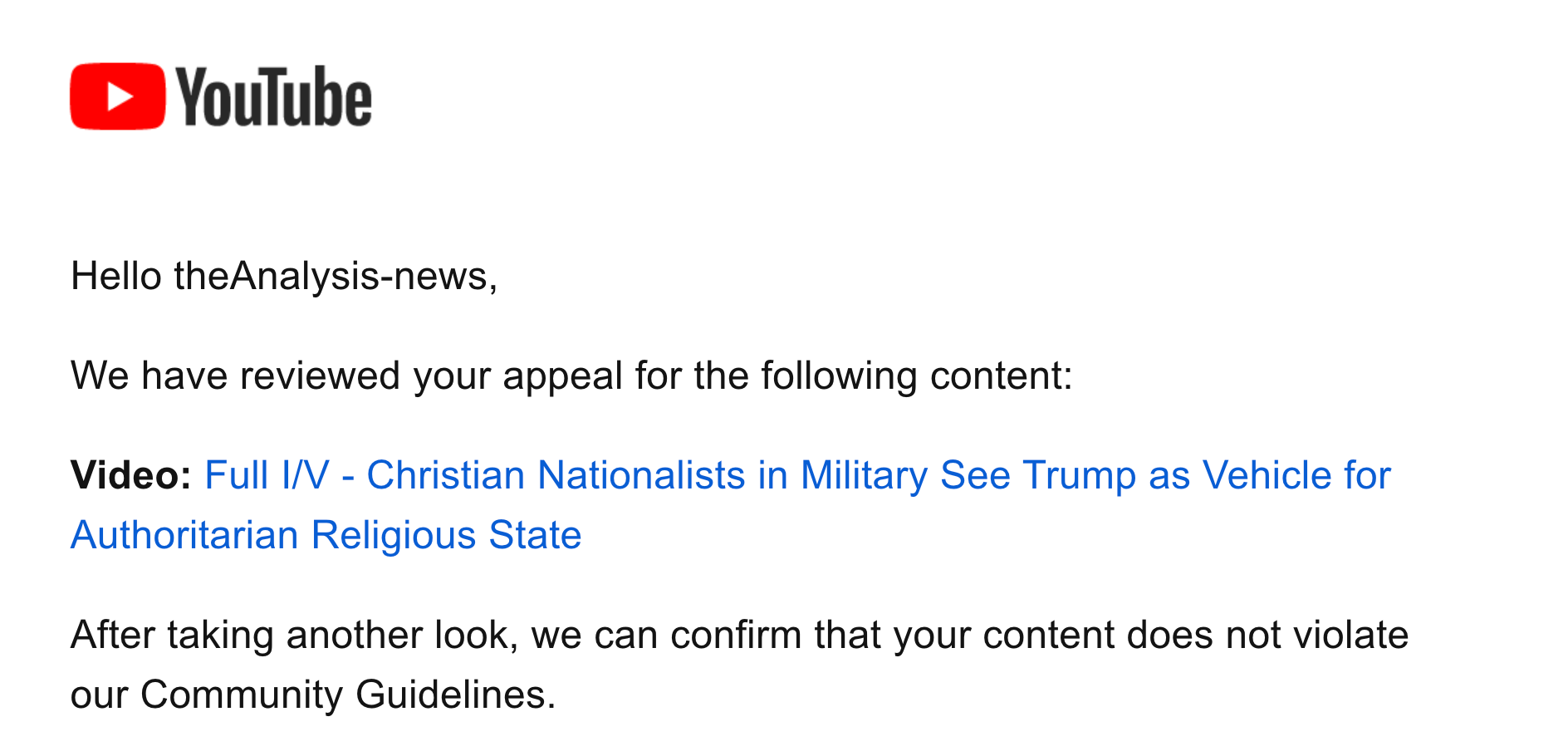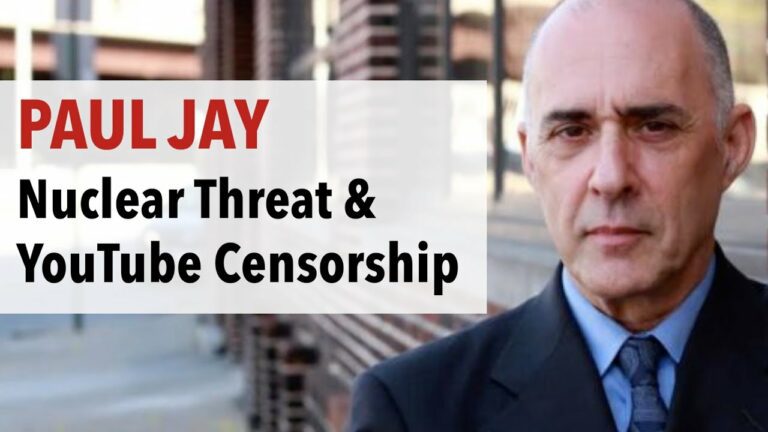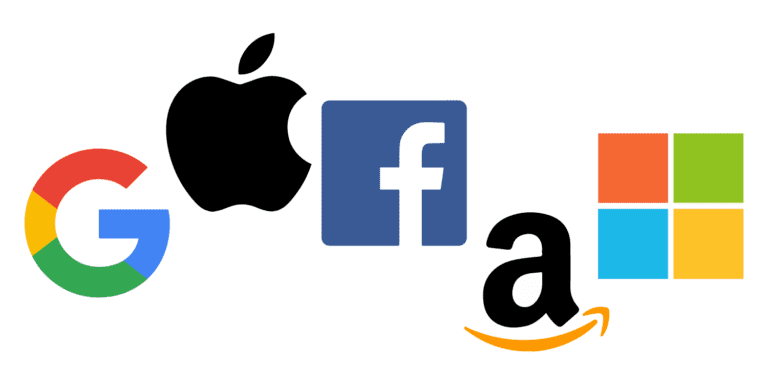
Matt Taibbi writes about YouTube’s censorship of theAnalysis.news “No matter what your political views, it should be troubling that the question of whether or not the public gets to see real video from important historical episodes like the events of January 6th is dependent on how companies like YouTube define proper “context.” If that definition changes regularly, and is not made public besides, journalism becomes a weird dystopian guessing game.
This article is out a day late. I was about to hit “send” on Meet the Censored: Paul Jay last night when the YouTube press team, whom I’d contacted for comment, suddenly reversed a series of penalties in a case involving a Canadian broadcaster named Paul Jay. Kudos to the Google/YouTube communications department for taking the time to get to the bottom of Jay’s complaint, which had already been rejected on appeal. Still, one major issue remains, and overall, it remains a bizarre episode, one that underscores the inherent limitations of algorithmic censorship.
Jay, the founder of the The Real News Network, now runs a site called The Analysis. He ran a video essay on February 7th called, “A Failed Coup Inside a Failed Coup.” YouTube promptly banned the piece, on the grounds that it was “content that advances false claims that widespread fraud, errors, or glitches changed the outcome of the U.S presidential election is not allowed on YouTube.”
In fact, Jay said the opposite. He was expressing an idea that would likely be welcome in many mainstream outlets: Donald Trump should be investigated for planning a coup. In fact, watered-down versions of his analysis have appeared here and there, especially since the release of a book quoting former Joint Chiefs Chair Mark Milley as saying Trump on January 6th was preaching the “The gospel of the Führer” in a “Reichstag moment.”
Jay similarly believed Trump’s speech was perhaps designed to incite a destabilizing moment during which acting Secretary of Defense Christopher Miller could declare martial law. The fear that Miller would do something along those lines was the ostensible reason 10 former Defense Secretaries wrote a joint letter in the Washington Post on January 3rd urging him to stay on the sidelines.
Virtually every mainstream American outlet has shown video of the January 6th speeches of people like Trump and Rudy Giuliani ad infinitum. Here’s a clip from the YouTube channel of the Washington Post on that theme:
When Jay received his notice from YouTube, he wondered what his offense could have been. Independent journalists across the spectrum now figure the whims of Internet algorithms into their editorial decisions, a habit that becomes more exasperating with time as “community standards” shift without notice. In this case Jay guessed his crime was showing clips of Trump speaking on January 6th, along with narration that said things like, “Trump decides to call the crowd into action.”
He released a new version of the piece without the video of Trump, and YouTube didn’t object to the second version. So he assumed he was right. Irritated, but also figuring the problem had been solved, he went to promote the new video, which was entitled, “Trump’s Treason and McConnell’s Mayhem.” Now he discovered his Google Ads account had been suspended.
Google’s general public explanation for why a Google Ads account may be suspended reads:
If we detect an egregious policy violation (defined below) your account will be suspended immediately and without prior warning.
Jay couldn’t imagine what he’d done that could be described as “egregious.” He appealed, but his appeal was turned down. He was incredulous. “I personally could never buy a Google ad,” he says now. “Never mind just on YouTube. I couldn’t go sell a cockamamie watch…”
Shortly thereafter, Jay ran an interview with Mikey Weinstein of the Military Religious Freedom Foundation, in which they discussed the presence of Christian “Dominionists” in the armed services. While the piece, entitled, “Powerful Christian Nationalists in Military See Trump as Vehicle for Authoritarian Religious State,” did discuss January 6th, it did not discuss the 2020 election. Nonetheless, YouTube banned it and gave Jay a strike for spreading false information about the 2020 election.
Even if you don’t agree with Jay’s conception of what happened on January 6th (I myself lean toward different explanations), his suppositions were factually based. It is true, for instance, that ten former defense secretaries publicly declared on January 3rd that “As extraordinary as it may sound, what amounts to an undeclared coup d’état is being attempted in the United States.”
Moreover, Jay had two offenses, neither of which really corresponded to what was in the actual content. In the first, YouTube seemingly accused him of making an argument opposite to the one he was making. In the second, YouTube appears to have simply made a mistake and found 2020 election agitation when it wasn’t there.
I reached out to Google early Tuesday, and to their credit, they had multiple people look at the issue. By Tuesday night they’d unsuspended Jay’s Google Ads and “reviewed” his already-denied appeal:

In a statement to me sent this afternoon, the company wrote:
Our Community Guidelines apply equally to everyone, regardless of whether they’re a small news channel or a larger media outlet. We do allow for content that provides sufficient educational, documentary, scientific and artistic context in the video, audio, title or description. This may include countervailing views, or if the purpose of the content is to condemn, dispute, or satirize misinformation that violates our policies.
After some back and forth, I can report a final score: every issue with Paul Jay has been corrected, save one. The “Christian Dominionist” piece was correctly re-assessed to have nothing to do with 2020 election misinformation, and the company has determined that the original action to remove it was a mistake.
Regarding the Google Ads ban, that seems to have been due in part, originally, to the company having instituted what it calls a “Sensitive Event” policy earlier this year, prohibiting any ads referencing January 6th. The company says there was an error with its enforcement process of these policies, and regrets the mistake.
Unfortunately, the remaining issue is a big one. Jay’s first video, “A Failed Coup Inside a Failed Coup,” remains deleted. YouTube confirms that it did remove that piece, though the explanation is limited to saying it violates its presidential election integrity policy. Though it’s difficult to say for sure, the uneventful release of a second version with Donald Trump edited out suggests the ban was and is for the same reason initially assumed: it contained a clip of Trump speaking to an excited crowd just before the events of January 6th.
Here’s a brief list of the news organizations whose YouTube channels continue to feature that same footage: NBC, CBS, The Telegraph, BBC, Bloomberg, the Guardian, VICE, the New York Times, and Politico (with warning). There are many others.
I did ask directly if the use of the video was the issue, and if so, why other outlets are allowed to use it. The company didn’t send a direct reply, though the statement about guidelines that “apply equally” to large and small companies appears to reference the question, and it seems logical to infer that Jay’s use of the Trump video didn’t satisfy YouTube’s idea of “sufficient educational, documentary, scientific and artistic context.”
Jay, as he points out, sourced his entire original piece to the mainstream sources Google would deem “authoritative”: New York Times, Washington Post, Time, etc. His thesis almost exactly mirrored the premise of the current bestselling book, “I Alone Can Fix It,” by Pulitzer-winning Washington Post reporters Carol Leonnig and Philip Rucker.
A running theme of controversial content moderation decisions dating back years now (but especially since January 6th) involves aggressive deletions and strikes against smaller, independent outlets who use the same footage permitted in work by larger commercial companies. From Jon Farina of Status Coup having footage of January 6th taken down that was not only used but lauded on channels like CNN (see the TK piece on that subjecthere) to Matt Orfalea and Alison Morrow being censured for “misinformation” for running video of NBC and CNN reports, this has become an increasingly common phenomenon.
It’s great that YouTube fixed the bulk of the decisions in Jay’s case. A cynic might say that his luck in this area might be tied to the anti-Trumpian character of his analysis, but I’m not so sure that’s the case. Even if these companies were trying to apply rules in an ideologically consistent manner, it wouldn’t matter. The real problem is that it’s technologically impossible to exercise human-level judgment in every case, and many of the smaller independent media ventures simply can’t survive algorithmic errors — another factor that will give large media companies a huge inherent market advantage over time.
No matter what your political views, it should be troubling that the question of whether or not the public gets to see real video from important historical episodes like the events of January 6th is dependent on how companies like YouTube define proper “context.” If that definition changes regularly, and is not made public besides, journalism becomes a weird dystopian guessing game.
I asked Jay about these and other questions:
Matt Taibbi: How does work in independent media change when you’re dependent upon a platform like YouTube?
Paul Jay: I once did an experiment where I was interviewing Rob Johnson from INET, and we put it up on TheAnalysis, and then he put it up on his New Economic Thinking. On mine it did, I think, 2,500 views. And on his, that did about 130,000 views. So it makes me wonder. Then I had a Matt Taibbi interview (!) before all the shit hit the fan on January 6th. And when I interviewed you, the first time, that did 89,000 views relatively quickly. And then I interviewed you again and, just as an experiment, I put a pretty much the same photo and everything, it did about 3,000 views. That was after the January 6th events.
Matt Taibbi: Regarding this latest episode, on the removal of your first video, the argument of people in favor of aggressive content moderation would likely be, “Trump’s words have to be deleted for a reason.” What would be your response?
Paul Jay: I’m doing journalism, and in journalism you can’t just make things up. You try to show, if it’s video, why you’re saying what you’re saying. I don’t want to just say, “I think Trump incited a crowd,” when I can show him inciting the crowd. But here’s another thing… they’re not pulling NBC down, who showed that Trump clip a zillion times.
I’m not in favor of the algorithms at all. Period. So let’s start with that. The whole idea of censorship through algorithm is BS. The idea that you can have the major platforms for public discourse privately owned, and exempt from any kind of public oversight, or even constitutional oversight, to me represents a step towards a kind of technocratic police state.
So, all that being said, I’d say to them, if you’re going to look at the appeal, a human being puts eyes on it, it’s kind of obvious if you’re promoting a fictitious thing about the elections or you’re doing journalism. A 10-year-old kid could look at the piece and say, “This piece is journalism.” So it’s not about that.
Matt Taibbi: I think what they’re trying to do with this kind of moderation is make sure that everything that is controversial is either properly “contextualized,” or replaced with a summary, composed by “authoritative” sources. But can people really understand history if they don’t see the original source material?
Paul Jay: I think the answer is no, they can’t. And how you contextualize that footage is critical. It’s not just about showing it because you could go on YouTube, I’m sure, and see that Trump clip in all the mainstream news, but they don’t contextualize it the way I contextualize it. And that’s part of understanding history.
Matt Taibbi: Is the result of this kind of censorship going to just drive audiences to big corporate news agencies? And if that’s the case, what can people do about that? What’s going to happen to alternative news, if there’s a double standard?
Paul Jay: Let’s back up one step. Why do they allow alternative media? The financial class, the billionaire class, the state, and so on. Why is there even an alternative media in the United States? Because on the whole it’s marginal, and as long as it’s marginal, it’s acceptable. Because democracy in the United States, in my mind, it’s a complicated thing. There really is a kind of democracy, that’s mostly for elites.
There’s a need to keep up a kind of facade of democracy. And maybe facade is too strong a word, because it’s not like there are no democratic rights. You still can go to a court, there is a jury, people can sue, they win sometimes, the odd progressive gets elected. There’s some there there, and it’s worth defending that, but there’s a facade that this democracy really allows dissenting voices. As long as they’re marginal, okay. So the more the big tech companies control this score, the better they can make sure that stuff stays marginal.
Matt Taibbi: Is it really worth the trouble to protect “marginal” media? Why not just take a nap next to the pod, and wake up in a less complicated media landscape?
Paul Jay: Gore Vidal had this line about USA: the United States of Amnesia. The educational system is so terrible. Most people have no idea what World War II was about, and we’re dealing with such a mass outside of the biggest cities, such a mass of people who, as a result of crappy educational system, have practically no understanding of history. So alternative media has some effect. Some of these progressives that got elected have some effect, but it’s still very controllable. What will change that? If that’s the question, alternative media has a role to play, but it’s not the thing that’s going to change it. There can be change to the extent there’s real organizing, a revitalization in the union movement, a real organizing in the working class, especially in states that have voted pro-Trump, but not only. There’s a big a problem in terms of corporate Democrats.
So real organizing is going to change it. And at the same time, as much as we can, we need to fight for the space to have our say, because I think a lot of alternative media is getting more of the story right.






> There’s a need to keep up a kind of facade of democracy. And maybe facade is too strong a word, because it’s not like there are no democratic rights. You still can go to a court, there is a jury, people can sue, they win sometimes, the odd progressive gets elected.
Well, we just saw the first (?) case of a corporation suing and convicting a person – a lawyer at that. I don’t think Steven Donzinger will agree there is even a façade of democracy. There is a brainwashed idea that there is democracy…
many thanks to both of you much respected journalist’s for sharing your efforts about you tube’s crap, so important. it’s folks like you that will help save us.
Please ask Matt Taibbi if he still supports the Bush Administration conspiracy theory about what happened on 9/11.